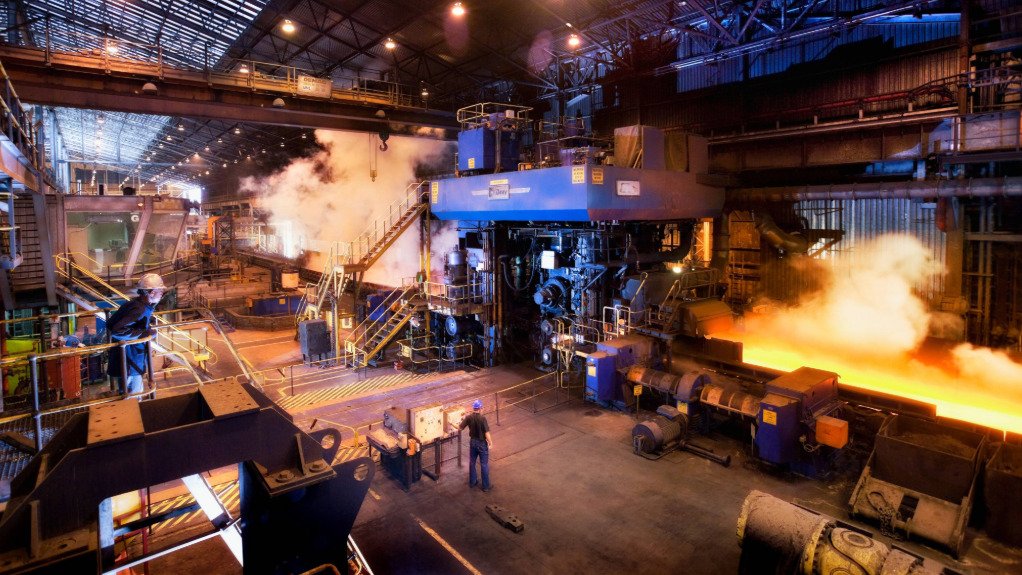Cooperation between the South African government and the steel manufacturing industry is imperative to address the underlying economic and other issues that created the current lack of local demand for steel, as well as protection to assist the local industry in defending itself against outside threats such as excessive imports, stainless steel flat products producer Columbus Stainless says in a statement.
The company says a fundamental aspect of this coordinated response should be the protection of the country’s national resources and that these resources should be managed in a holistically beneficial manner designed to create the maximum benefit for the total South African economy.
Therefore, the export of any non-beneficiated raw materials, whether as ore, scrap or in any other form, should be critically examined with the ultimate goal of using South African resources for the overall benefit of the country, the company suggests.
It emphasises that, specifically, the export of raw materials, including scrap, should be managed in a way that ensures overall cost competitiveness in the manufacturing industry, where the country can benefit the most, owing to the ability of the manufacturing sector to create both employment and revenue.
Columbus points out that a recent surge in global scrap prices, intensified by the imposition of export taxes by certain countries, poses a significant challenge to South African producers that incorporate scrap into their manufacturing processes.
“In South Africa, electric arc furnace (EAF) operators are heavily reliant on ferrous scrap steel as a primary raw material. This reliance on scrap steel enables local steel producers to maintain their competitiveness on the global stage, not only in terms of cost, but also due to the environment-friendly nature of maximising scrap utilisation,” the company explains.
Columbus highlights that environment-friendly steel manufacturing techniques employed by certain South African steel producers, including the company, support over 5 000 jobs, while adhering to international standards
It adds that these processes are both economically viable and competitive on a global scale.
Given the growing emphasis on the green economy and the implementation of measures such as the Carbon Border Adjustment Mechanism by the EU, South Africa’s carbon-intensive electricity generation, which relies on coal, poses additional challenges, Columbus warns.
To minimise the carbon footprint associated with steel production, it stresses the need to use domestically produced scrap metal.
“Given the critical importance of the domestic steel industry to the South African economy, the inherent environmental and economic benefits associated with utilising scrap in steel manufacturing, and the necessity to conserve scarce resources such as scrap for the national welfare, the significance of preserving affordable, high-quality scrap metal for the local industry becomes readily apparent,” the company avers.
Columbus posits that the prohibition of scrap exports should be actively reconsidered to accurately assess the adverse effects of permitting this resource to leave the country.
An alternative, albeit less stringent, approach would be to retain the scrap steel export tax, the company suggests.
“In the absence of a scrap export ban, this tax would play a pivotal role in ensuring the sustainability and long-term viability of environmentally-friendly and globally cost-competitive domestic steel production, by securing an adequate supply of scrap metal,” it explains.
The scrap export tax is presented as an alternative to the existing Price Preferential System (PPS), which is specifically designed to curb scrap metal exports by establishing a price below the free on board Rotterdam scrap price, Columbus points out.
The PPS price is determined by factoring in export distribution costs to establish a net export parity price for ferrous scrap, it adds.
“In the absence of a scrap export ban, a scrap export tax would contribute to the survival of numerous local steel mills, preventing significant job losses. This aligns with the government’s commitment to industrial diversification and sustainability further supporting global efforts to promote recycling and the decarbonisation of the steel sector.
“South African steel producers, including Columbus, are eager to collaborate with the government to ensure that policy decisions are made in the best interests of the industry and the nation. A holistic approach that protects the diversity and sustainability of the entire steel value chain is essential for the future success of the South African steel industry,” the company says.
Edited by: Chanel de Bruyn
Creamer Media Senior Deputy Editor Online
EMAIL THIS ARTICLE SAVE THIS ARTICLE
ARTICLE ENQUIRY
To subscribe email subscriptions@creamermedia.co.za or click here
To advertise email advertising@creamermedia.co.za or click here













